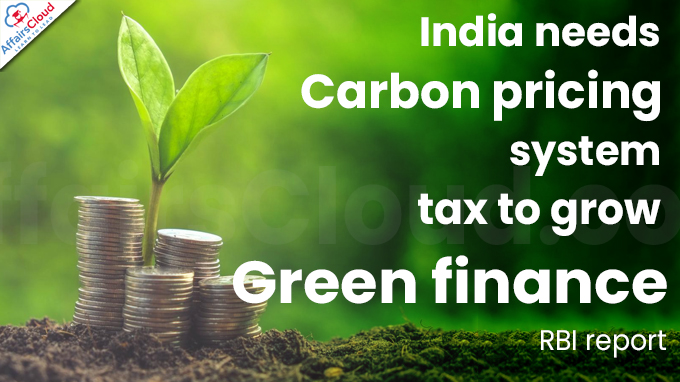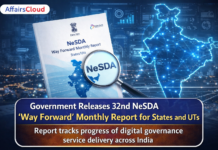 The report released by Reserve Bank of India (RBI) Report On Currency And Finance 2022-23 on May 03, 2023, recommends India to introduce a broad-based carbon pricing system in line with emerging global best practices to meet the country’s climate goals.
The report released by Reserve Bank of India (RBI) Report On Currency And Finance 2022-23 on May 03, 2023, recommends India to introduce a broad-based carbon pricing system in line with emerging global best practices to meet the country’s climate goals.
- The theme of the report is – ‘Towards a Greener Cleaner India’,
- The report does not represent the views of the RBI, inturn it is based on the findings, views and conclusions of the contributors from the Department of Economic and Policy Research (DEPR).
Key Recommendations of the Report to India:
i.The carbon tax was suggested to be accompanied by complementary redistributive policies due to its regressive nature, in view of the inability of the weaker sections of the society to move to eco-friendly modes of production and patterns of consumption.
ii.The report also recommends introduction of an Emissions Trading System (ETS) linked to green taxonomy, covering all sectors of the economy, which can partly balance subsidy (less polluting industries getting carbon credits for trading) and tax (more polluting industries that should have to buy carbon certificates).
- As per the report, a carbon tax may be more effective, an ETS may be less politically contentious.
iii.Green Taxonomy:
- It also mentioned the requirement of an effective green taxonomy to identify sustainable green assets and activities and limit the potential risk of greenwashing.
- Suggestion was made to properly record public spending on climate change and related issues after the implementation of Green taxonomy.
- The issues need to be reported in a climate budget report as a supplement to the annual budget.
iv.India needs to find ways to improve access to technology and critical mineral resources through multilateral, regional and bilateral strategic partnerships.
v.Furthermore efforts are required to address the variability in wind and solar power supply through appropriate energy storage technology and demand management mechanisms using smart grids.
vi.Improving Domestic Capacity:
- The report also suggests to improve the domestic capacity to mine lithium, cobalt and rare earth elements and/or procure them through long-term contracts and outward FDI (Foreign Direct Investment).
- Suggestion was also made to increase the domestic manufacturing of critical equipment such as batteries, electrolysers, PV cells, EVs, other associated components.
- Application of AI (Articifial Intelligence) and ML (Machine learning) need to be advanced for better resource management.
Prevailing Climate Action Plan:
i.India has updated its Nationally Determined Contributions (NDCs) with the target of Net Zero emissions by 2070, to raise the share of renewable energy and reduce the carbon emissions intensity of GDP by 2030.
ii.India has also launched the International Solar Alliance, the Coalition for Disaster Resilient Infrastructure, and the Mission LiFE (Lifestyle for Environment).
-RBI Data: India’s Service Exports increased by 26.6% in FY23
i.According to the data released by RBI on 2nd May 2023, India’s services exports increased by a record 26.6% in 2022-23 (FY23) to US$ 322 billion.
- Services imports grew 22.2 % to US$179.7 billion, leading to a services trade surplus of US$142.5 billion.
ii.Merchandise exports rose by only 6% to US$ 447 billion in FY23.
- With a US$267 billion merchandise trade deficit in FY22, India has a cumulative trade deficit (or net exports) of US$124.5 billion.
iii.While software exports continue to dominate India’s services exports.
- The ‘other business services’ exports have increased accounting for 24% of total services exports in the first nine months of FY23 (April-December, 2022), up from 19% in FY14.
iv.The Union government has set a goal of US$ 2 trillion in combined goods and services exports by 2030.
Recent Related News:
On January 4, 2023, the Reserve Bank of India (RBI) released the Annual Report of the Ombudsman Schemes for the period April 01, 2021 – March 31, 2022. Issues related to ATM (Automated Teller Machine)/debit cards were the highest at 14.65% of the total received at the Office of Banking Ombudsman (OBO) from April 1 to November 11, 2021.
About Reserve Bank of India (RBI):
Governor– Shaktikanta Das
Deputy Governors – Mahesh Kumar Jain, Michael Debabrata Patra, M. Rajeshwar Rao, T. Rabi Sankar
Headquarters – Mumbai, Maharashtra
Establishment – 1st April 1935




